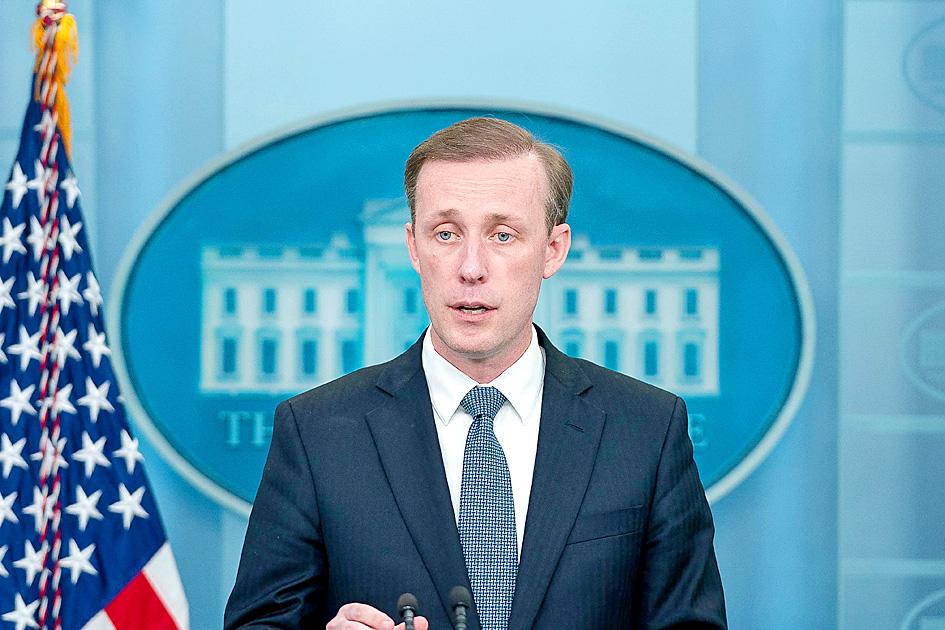US President Joe Biden is expected to unveil a list of nations today who would be joining a long anticipated Indo-Pacific region trade pact, but Taiwan will not be among them.
US National Security Adviser Jake Sullivan said that Taiwan is not among the governments included in the launch of the Indo-Pacific Economic Framework, a trade pact that is meant to allow the US to work more closely with key Asian economies on issues including supply chains, digital trade, clean energy and anticorruption efforts.
The US president is scheduled to highlight the launch of the framework as he meets with Japanese Prime Minister Fumio Kishida today.

Photo: AFP
“We are looking to deepen our economic partnership with Taiwan, including on high technology issues, including on semiconductor supply, but we’re pursuing that in the first instance on a bilateral basis,” Sullivan said.
The framework is meant to establish Biden’s economic strategy for the region.
Matthew Goodman, senior vice president for economics at the Center for Strategic and International Studies in Washington, said that some Pacific signatories are likely to be disappointed, as the pact is not expected to include provisions for greater access to the US market.
“I think a lot of partners are going to look at that list and say: ‘That’s a good list of issues. I’m happy to be involved, but, you know, are we going to get any tangible benefits out of participating in this framework?’” said Goodman, a former director for international economics on the US National Security Council during former US president Barack Obama’s administration.
Beijing has criticized the US effort to form the trade pact.
“We hope they will build an open and inclusive circle of friends in Asia-Pacific, rather than an exclusive clique, and do more for peace and development rather than creating turmoil and chaos in the region,” Chinese Ministry of Foreign Affairs spokesman Wang Wenbin (汪文斌) said.
The Ministry of Foreign Affairs yesterday expressed regret over Taiwan’s exclusion from the first round of IPEF members.
As an important economy, Taiwan plays a crucial role in the global supply chain and definitely qualifies for IPEF membership, it said, adding that the government would continue to seek new opportunities to join the pact.
Additional reporting by staff writer

INVESTIGATION: The case is the latest instance of a DPP figure being implicated in an espionage network accused of allegedly leaking information to Chinese intelligence Democratic Progressive Party (DPP) member Ho Jen-chieh (何仁傑) was detained and held incommunicado yesterday on suspicion of spying for China during his tenure as assistant to then-minister of foreign affairs Joseph Wu (吳釗燮). The Taipei District Prosecutors’ Office said Ho was implicated during its investigation into alleged spying activities by former Presidential Office consultant Wu Shang-yu (吳尚雨). Prosecutors said there is reason to believe Ho breached the National Security Act (國家安全法) by leaking classified Ministry of Foreign Affairs information to Chinese intelligence. Following interrogation, prosecutors petitioned the Taipei District Court to detain Ho, citing concerns over potential collusion or tampering of evidence. The

‘FORM OF PROTEST’: The German Institute Taipei said it was ‘shocked’ to see Nazi symbolism used in connection with political aims as it condemned the incident Sung Chien-liang (宋建樑), who led efforts to recall Democratic Progressive Party (DPP) Legislator Lee Kun-cheng (李坤城), was released on bail of NT$80,000 yesterday amid an outcry over a Nazi armband he wore to questioning the night before. Sung arrived at the New Taipei City District Prosecutors’ Office for questioning in a recall petition forgery case on Tuesday night wearing a red armband bearing a swastika, carrying a copy of Adolf Hitler’s Mein Kampf and giving a Nazi salute. Sung left the building at 1:15am without the armband and apparently covering the book with a coat. This is a serious international scandal and Chinese

Seventy percent of middle and elementary schools now conduct English classes entirely in English, the Ministry of Education said, as it encourages schools nationwide to adopt this practice Minister of Education (MOE) Cheng Ying-yao (鄭英耀) is scheduled to present a report on the government’s bilingual education policy to the Legislative Yuan’s Education and Culture Committee today. The report would outline strategies aimed at expanding access to education, reducing regional disparities and improving talent cultivation. Implementation of bilingual education policies has varied across local governments, occasionally drawing public criticism. For example, some schools have required teachers of non-English subjects to pass English proficiency

TRADE: The premier pledged safeguards on ‘Made in Taiwan’ labeling, anti-dumping measures and stricter export controls to strengthen its position in trade talks Products labeled “made in Taiwan” must be genuinely made in Taiwan, Premier Cho Jung-tai (卓榮泰) said yesterday, vowing to enforce strict safeguards against “origin laundering” and initiate anti-dumping investigations to prevent China dumping its products in Taiwan. Cho made the remarks in a discussion session with representatives from industries in Kaohsiung. In response to the US government’s recent announcement of “reciprocal” tariffs on its trading partners, President William Lai (賴清德) and Cho last week began a series of consultations with industry leaders nationwide to gather feedback and address concerns. Taiwanese and US officials held a videoconference on Friday evening to discuss the